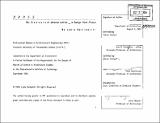Dross : re-genesis of diverse matter : a design post-praxis
Author(s)
Kallipoliti, Lydia, 1976-
DownloadFull printable version (42.43Mb)
Alternative title
Re-genesis of diverse matter : a design post-praxis
Other Contributors
Massachusetts Institute of Technology. Dept. of Architecture.
Advisor
Ann M. Pendleton-Jullian and Mark Goulthrope.
Terms of use
Metadata
Show full item recordAbstract
The word "dross" refers to matter that is foreign, worn out and impure, such as the scum formed by oxidation at the surface of molten metals. Based on a perception of material impurity, this thesis encompasses the generative potential of obsolete objects and spaces, or in other words waste material that is displaced culturally or functionally from its previous identity. The cultural fabric for this thesis revolves around the material ramifications of unprecedented technological evolutions in communications, in terms of unparalleled waste production of defunct apparatuses. As rapid growth rates in technology have irreversibly shifted our consumption modes, immense amounts of 'techno-junk' are being produced, not only in the size of objects (defunct computers), but also in the size of rooms (oil tanks, air-conditioning tubes, containers etc.) and buildings ('brownfields', abandoned landscapes). The content of this thesis engages 'obsolete matter' in various scales of reference, or 'techno-excrements' as an emerging city-born condition, derivative of the urban system's internal erosion. Since it is impossible to dispose of these objects due to their extremely high-embodied material energy, this thesis lies on the premise of their 'architectural' reuse and the development of post-praxis design strategies. The mandate behind this intention is to revisit our design and material culture, not by attempting to create new memory, but by recycling meanings of objects and spaces with embedded memory. In terms of the methodology used, the intent is to go beyond existing techniques, such as reuse through signification and collage of unrelated building parts and to explore the possibilities of cast materials and generative processes of 'moulding' (cont.) related to computation.
Description
Thesis (S.M.)--Massachusetts Institute of Technology, Dept. of Architecture, 2004. Includes bibliographical references (leaves 224-254).
Date issued
2004Department
Massachusetts Institute of Technology. Department of ArchitecturePublisher
Massachusetts Institute of Technology
Keywords
Architecture.